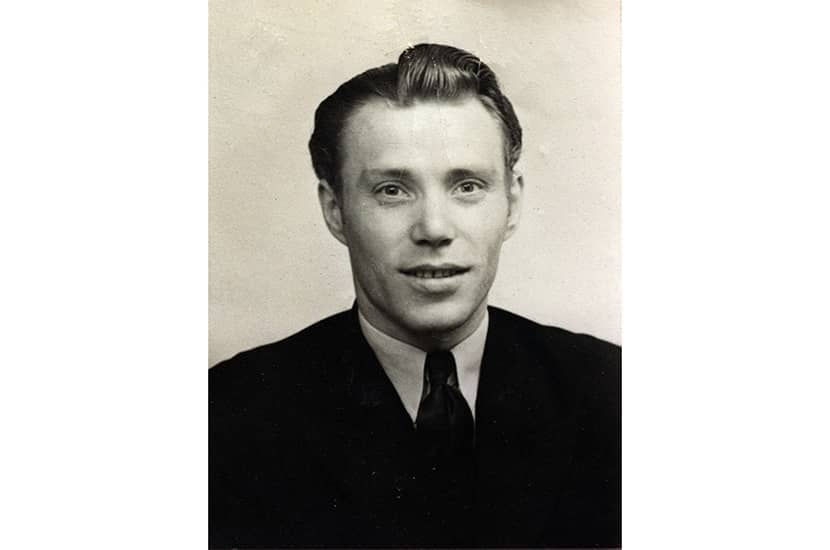Fedor Zan was 18, working on the river closing sluices, when, on a winter afternoon in 1942, he saw his childhood friend Andrei Sawoniuk standing in a clearing outside Domachevo, their town in Belarus. Sawoniuk had lined up 15 terrified women, all wearing the yellow Jewish star. As Zan watched, hidden behind the pine trees, Sawoniuk ordered the women to strip naked, shot them in the back and kicked their bodies into a newly dug pit.
Fifty-seven years later, Zan was one of a dozen witnesses to give evidence against Sawoniuk at the Old Bailey, at the only war crimes trial ever held in Britain. Though the UK lost interest soon after the second world war in prosecuting war criminals, the Simon Wiesenthal Centre continued to pursue former Nazis all over the world, and in 1985 the names of 97 suspects living in Britain were handed to the authorities. One of those on the list was Sawoniuk, recently retired after working for 35 years on the railways, a British citizen by virtue of having deftly changed sides in the closing months of the war.
Agitated, furious, contradicting himself and clearly deeply unpleasant, Sawoniuk did not help his case
Even so, it was only in 1991, after many debates in parliament and the passing of a War Crimes Act, framed to allow British citizens to be charged with crimes committed in Nazi-occupied Europe, that the British police went in search of the suspects. One man was charged but died after being declared unfit to stand trial. Others had disappeared or died, or the evidence against them was found to be insubstantial. Sawoniuk, by now a sad, choleric figure living alone in the East End, was the only one to be brought before the courts.
Mike Anderson and Neil Hanson have based their story on the court transcripts annotated by the judge, the late Sir Humphrey Potts, on the vast amount of news coverage and on interviews with survivors, witnesses, detectives and historians. It makes an extraordinary tale, not least because of the light it throws on the persistence and thoroughness of the British legal system.
The first Einsatzgruppen, the SS death squads, swept into Domachevo on 19 September 1942, the eve of Yom Kippur. After an initial round-up and massacre of 2,900 Jews, they recruited auxiliaries to help them with further arrests and killings. One of the first to volunteer was the 21-year-old Sawoniuk, a barely literate bully who terrorised local children. When the SS retreated from Belarus in the summer of 1944, he fled with them to East Prussia, served with other collaborators in various auxiliary forces and eventually, having joined a Polish corps, was able to make his way to Britain. He married several times, changed his Christian name to Tony and found a job as a ticket collector on British Rail.
The account of how he was finally identified and tracked down makes lively reading. The sum of £30 million was allocated to pursuing the suspects and sifting through the records of a quarter of a million Poles who had come to Britain after the war. More fascinating, though, is the trial itself in 1999. Four hundred possible witnesses in nine countries were questioned and, once the trial got under way, the 12 jurors were flown to Warsaw, then bussed through a blizzard to the forests of Belarus to inspect the sites of massacres. Of the witnesses then brought to appear at the Old Bailey, almost all were in their seventies and none had ever flown in a plane before. One woman had never even been on a train. One man, unaccustomed to comfort, spent his evenings luxuriating in hot baths. A crucial witness for the prosecution was another childhood comrade of Sawoniuk’s, Ben-Zion Blustein, who joined the partisans and whose entire family had been wiped out by the killers.
The wealth of evidence against Sawoniuk seemed overwhelming, despite the defence team’s efforts to chip away at the credibility of the witnesses and portray their client as a pathetic orphan, coerced by forces beyond his control. Sawoniuk himself, agitated, furious, contradicting himself and patently deeply unpleasant, did not help his case. After 27 days in court, and a deliberation by the jury that lasted more than 14 hours, he was found guilty on two counts and sentenced to life. He died in prison six years later.
The Ticket Collector from Belarus, much of which is given over to day-to-day court proceedings, is somewhat overlong. The vast literature on the Holocaust, however, contains much more on the extermination camps than on the rampaging SS death squads that massacred their way across the territories they occupied, the men memorably called ‘ordinary’ by the historian Christopher Browning; and still less about the eagerness of local collaborators, such as Sawoniuk, to do their bidding. As a dismal picture of wartime Belarus — which lost half its population first to the Nazi death squads, then to the Russians, and where, out of Domachevo’s 4,000 Jews only 13 survived — it makes for fascinating reading.






Comments